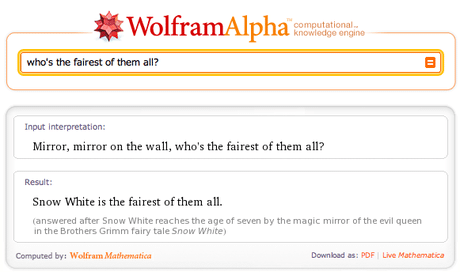
25+ Easter Eggs Kids (& Adults) Can Discover On Wolfram Alpha
Recently the Wolfram|Alpha team blogged “10 Fun Questions Kids Can Answer with Wolfram|Alpha.” It’s worth a read, as it lists some great examples of what can be done with this “computational engine,” if only because Wolfram|Alpha can seem awkward to use at first. Just some of the suggestions from the blog post are:
- Find out the popularity of your name
- Find out how many sides a given shape has
- Find words that rhyme
Wolfram|Alpha has some cool parental uses too, in that it can answer some typically childlike questions, such as, “When I grow up, will I be as tall as you?” or satisfy a child’s curiosity (and the Rainman in all of us) to know exactly how long it will be until their next birthday.
Furthermore, virtual Easter eggs buried within the index could almost be used to alleviate some of the more mind numbing tasks of dealing with children’s questions. For example, next time you find yourself resigned to saying, “Just because,” to your kids, instead, you could conceivably reply, “Why don’t you ask Wolfram|Alpha?”
1. Are we there yet?

2. Whhhhhhhy?
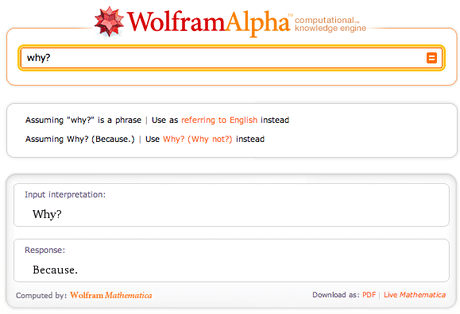
3. Why NOT?

4. Where do babies come from?
And, if you’re not ready for “the birds and the bees” chat yet, you could see what your kid makes of Wolfram|Alpha’s answer.

Other kids oriented Easter eggs are:
Tongue Twisters
Wolfram|Alpha will play along with quite a few tongue twisters including:
5. How many pickled peppers did Peter Piper pick?
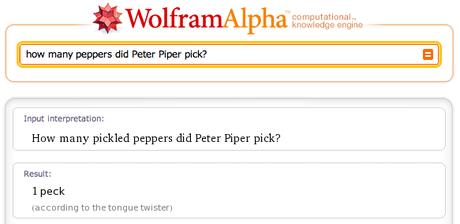
6. How many boards could the Mongols hoard if the Mongol hordes got bored?

7. How many cans can a cannibal nibble if a cannibal can nibble cans?
8. How much wood would a woodchuck chuck if a woodchuck could chuck wood?”
Where, hilariously, a footnote has been added about the physical limitations of being a Woodchuck.
Fantasy and Fairy-tales
9. Who is the fairest of them all?

10. Who’s afraid of the big bad wolf?
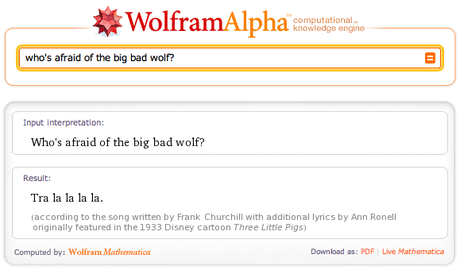
Not strictly an Easter egg, but still of interest, is the definition of a Pied Piper:

Finally, although quite staid in it’s display of results, Wolfram|Alpha does a decent job of defining mythical beasts, such as Griffins and Manticores.
Movies
Wolfram|Alpha displays an uncanny penchant for films, treating the questions you ask it with comical seriousness.

12. As many other blogs have noted, in the results for 88 mph, the results draws a comparison with the speed required at the end of “Back to the Future.”

But the engine will give you straight answers to even the most spurious questions. I mean, really… What is a Flux Capacitor?
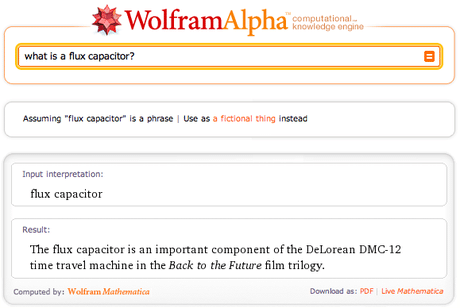
13. And… What are Midiclorians?
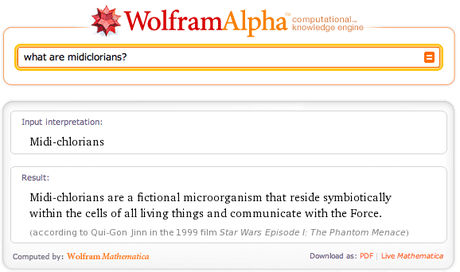
14. Or… What is Dilithium?
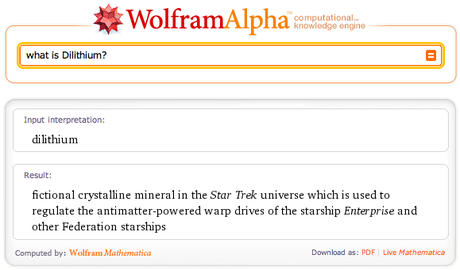
15. And is Wolfram|Alpha also obssessed with “Star Wars”? Surprisingly very few keywords were required to define this query: “who is luke’s father?“
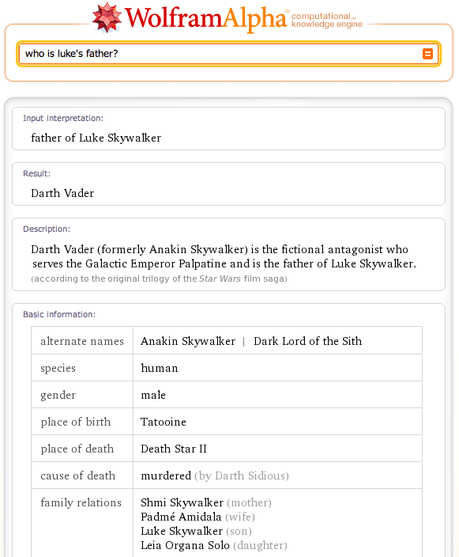
16. While “The Usual Suspects,” strictly speaking, isn’t a film for kids, I was pleasantly surprised by this result: Who is Keyser Soze?
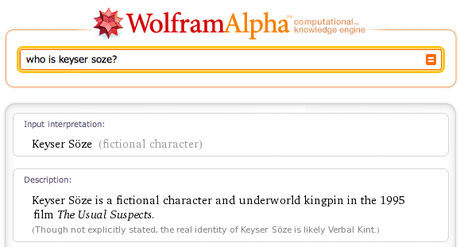
Not included in this list are the identity of superheroes, which is also a fun game. Try for yourself…
17. My favorite, and the most well known Wolfram-Alpha Easter egg, is the attempt to answer the ultimate question from “Monty Python and the Holy Grail,” What is the air-speed velocity of an unladen swallow? But did you know that particular question foreshadows a discussion earlier in the film?
Soldier #1: Where’d you get the coconuts?
Arthur: We found them.
Soldier #1: Found them? In Mercia? The coconut’s tropical!
Arthur: What do you mean?
Soldier #1: Well, this is a temperate zone.
Arthur: The swallow may fly south with the sun or the house martin or the plover may seek warmer climes in winter, yet these are not strangers to our land?
Soldier #1: (pause) Are you suggesting coconuts migrate?
Arthur: Not at all. They could be carried.
Soldier #1: What? A swallow carrying a coconut?
Arthur: It could grip it by the husk!
Consequently, the question that must be asked is “could a swallow carry a coconut?“

Songs
There are also some funny Easter eggs in answer to song lyric searches.
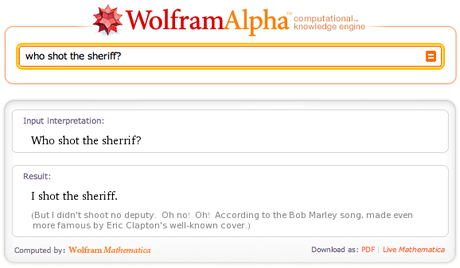
19. What are you going to do with all the junk? (from the Black Eyed Peas song, “My Humps”)

Those were the best I could find. Can you find any more? Drop a link in the comments if you do.
Undoing Conspiracy Theory
On the topic of conspiracy theories and weird science, in contrast to the entire Internet, this computational engine is refreshingly partisan on certain topics. Perhaps, “no-nonsense” would be a better way to put it, typical of an academic scholar. In fact, you almost get the feeling Stephen Wolfram himself may be speaking through the medium.
20. On the subject of whether mankind has landed on the moon, the response contains absolute conviction whichever way you cut it.
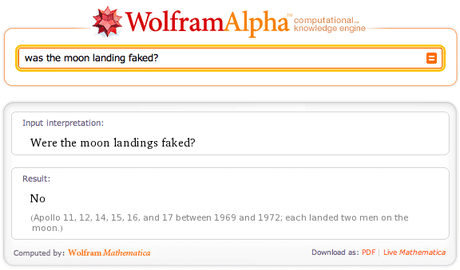
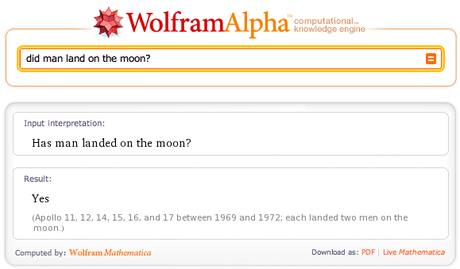
21. On the subject of extra-terrestrial life, there’s no doubting their position either.
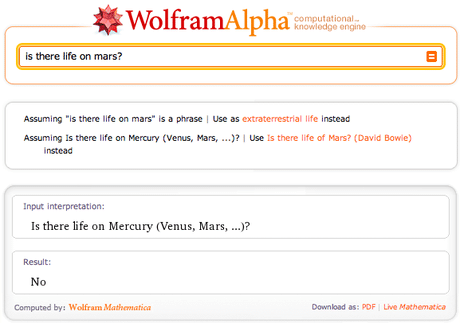
Belief & Philosophical Error
For particularly precocious children, there are some real gems to be found.
22. Does God exist?
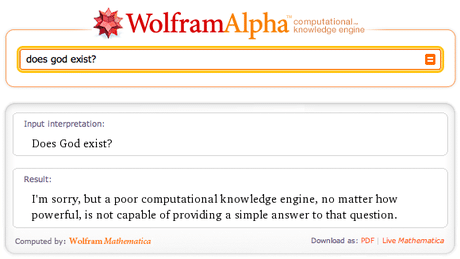
23. What is the meaning of life?
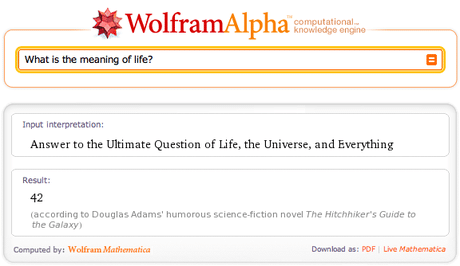
24. Another well documented Wolfram|Alpha Easter egg is it’s obvious response to the question, did the chicken cross the road? But have you seen the answer to, “which came first: the chicken or the egg?“
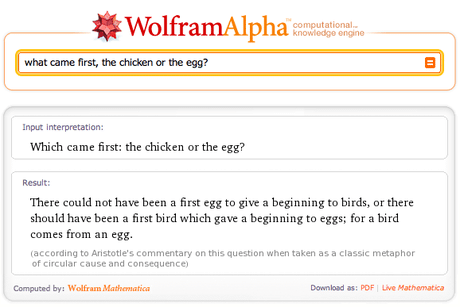
25. Some of the answers will knock any adult off their chair. Despite a Literature & Philosophy degree, I was still convinced there was no definitive answer to the question “if a tree falls in the wood, does it make a sound?” Clearly, I should have paid more attention in class.

26. I got a shudder when I discovered the following little gem. It’s almost evidence of the type of computational irregularity which might cause a machine to become sentient or perceive a soul. Albeit a dark and morbid soul, like HAL from “2001: A Space Odyssey”.
Bear with me, as what follows is a bit obtuse. Ludwig Wittgenstein, a great philosopher of mind and mathematical genius, argued that we could not know the absolute essence of a soul, even if we all agreed and believed in the existence of it. Using the beetle in a box “mind game” he illustrated that the certainty with which human beings discuss the existence of their soul, is actually an agreement about nothing in particular.
He argued that the concept of a soul, is similar to everyone being in possession of a box, in which they were hiding a beetle, but they were forbidden to reveal it to anybody. While everyone was allowed to discuss the beetle they had in the box, they could not compare them with each other. Therefore, they operated on the assumption that everyone’s beetle was the same as their own, despite never having any proof to that effect. In short, he threw into question the absolute certainty with which previous philosophers had posited the existence of “meta-physical” phenomena, such as souls and minds, as no one could verify the existence of anyone else’s beetle.
In many ways, Wittgenstein’s rationale opened the doors to people being allowed to have their own beliefs, about human nature and human experience, rather having those beliefs prescribed by the church. Original sin was one such idea that needed to be re-examined as a result.
So, I repeat, it is with a shudder that Wolfram|Alpha’s answer to What is in the box? takes the refutation almost forward and backward simultaneously. Our latter day HAL citing a character from the sci-fi novel “Dune” echoes an undeniable and common experience of life, so close to original sin of the past and yet so modern in it’s context. It’s genius.
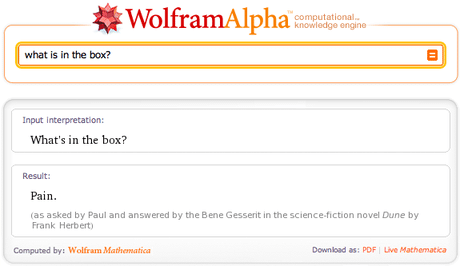
As you can see from all of the queries above, the Wolfram|Alpha team and their troupe of editors and academics gave the engine a bit of personality and playfulness. It’s brilliant. I love it. I would go as far to say that you could call Wolfram|Alpha the Stephen Fry (once, the most followed man on Twitter) of search engines. But don’t let a robot tell you, or your kids, the meaning of life.
This article was originally published in Search Engine Watch on 13th August, 2010.